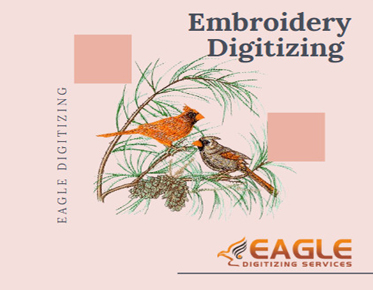Essential Tips for Enhancing Your Logo with Embroidery Digitizing
In the dynamic world of branding, your logo serves as the beacon of your identity, conveying your values, ethos, and uniqueness. With embroidery digitizing, you have the power to elevate your logo from mere imagery to a tangible, textured representation of your brand. This article delves into the crucial tips for harnessing the potential of embroidery digitizing to enhance your logo and make it stand out in a crowded marketplace.
Definition
and Process
Embroidery digitizing is the art of translating intricate designs into digital formats compatible with embroidery machines. It involves dissecting the design into individual stitches and meticulously arranging them to replicate the original artwork. This process requires a delicate balance of technical expertise and artistic finesse.
Importance of Digitizing for Embroidery
The importance of digitizing for embroidery lies in its ability to preserve the integrity of the design during the stitching process. With proper digitization, even the most meticulously crafted logos may retain their essence when embroidered. Digitizing ensures that every detail, from the finest lines to the subtlest gradients, is faithfully reproduced on fabric, resulting in a visually stunning finished product.
Simplifying
Complex Designs
When choosing a logo for embroidery, simplicity reigns supreme. Complex designs with intricate details may lose their impact when translated into stitches. It's essential to streamline the design, focusing on the core elements that define your brand identity. By simplifying the design, you not only ensure clarity and legibility but also enhance the overall visual impact of the embroidered logo
Choosing Appropriate Colors
In addition to simplification, selecting appropriate colors is paramount in ensuring the vibrancy and coherence of the embroidered logo. Vibrant hues may dazzle on a screen but may appear muted or distorted when embroidered. Opting for colors that complement each other and adhere to embroidery constraints ensures that the logo maintains its visual appeal across various mediums.
Size
and Scale
Size and scale play a pivotal role in
determining the effectiveness of an embroidered logo. Logos that are too small
may lose detail, while oversized logos may overwhelm the fabric. Finding the
perfect balance between size and detail is crucial for achieving optimal
results. Consider factors such as the intended placement of the logo and the
intricacy of the design when determining the appropriate size
Stitch
Type Selection
Equally important is the selection of stitch types, each imparting its unique texture and visual effect to the embroidered logo. From satin stitches for smooth surfaces to fill stitches for dense coverage, choosing the right stitch type enhances the tactile and visual appeal of the embroidered logo. Experimenting with different stitch types allows for creative expression while ensuring that the logo maintains its integrity.
Cleaning
Up the Design
Before embarking on the digitization process, it's essential to prepare the logo for seamless translation into stitches. This involves cleaning up the design, removing extraneous elements, and optimizing it for embroidery. Simplifying the design not only facilitates digitization but also ensures that the embroidered logo remains faithful to the original artwork.
Converting
to Appropriate File Formats
Converting the logo to appropriate file formats is the next step in preparing for digitization. Most embroidery machines require designs to be in specific formats, such as .dst or .emb. Converting the logo to the correct format ensures compatibility with the embroidery machine, laying the foundation for a smooth digitization process.
Importance
of Skilled Digitizers
Collaborating with a skilled digitizer is
essential for realizing the full potential of embroidery digitizing.
Experienced digitizers possess the technical prowess and artistic vision to
transform designs into stunning embroidered logos. The digitization process is
often a collaborative endeavor, with the digitizer providing valuable insights
and recommendations based on their expertise.
Collaborative
Process
Effective communication is key to a successful collaboration with digitizing services. Providing clear instructions and reference materials ensures that the digitizer understands your vision and requirements. Regular communication allows for feedback and adjustments, ensuring that the digitized logo aligns with your branding objectives.
Clear communication with digitizing services is essential for ensuring that your logo is digitized according to your specifications. Providing detailed instructions and reference materials helps the digitizer understand your vision and preferences accurately. Whether it's specific design elements or preferred colors, clear communication upfront can prevent misunderstandings and ensure that the final embroidered logo meets your expectations.
Regular communication throughout the digitization process allows for feedback and adjustments as needed. If any changes or modifications are required, addressing them promptly ensures that the final embroidered logo aligns with your branding objectives.
Stitching
test runs
Before finalizing the digitized logo, it's crucial to conduct stitching test runs to assess its quality and appearance. Stitching test runs allow for the identification of any issues or inconsistencies that may need to be addressed. Making necessary adjustments based on the results of test runs ensures that the final embroidered logo meets your standards of excellence.
Making
necessary adjustments
Adjustments may include fine-tuning stitch densities, tweaking color combinations, or refining intricate details. By iteratively testing and adjusting the digitized logo, you can ensure that the embroidered logo achieves the desired aesthetic and quality.
Considerations
for different fabrics
Considerations for different fabrics and
materials are essential for achieving optimal results in embroidery digitizing.
Factors such as fabric type, thickness, and texture can influence the
appearance and durability of the embroidered logo.
Adjusting design for material texture
Adjusting the design and stitch settings to accommodate these factors ensures
that the logo looks its best on the intended material. For example, designs
intended for lightweight fabrics may require finer stitches to prevent
puckering or distortion. Conversely, designs intended for thicker materials may
necessitate bolder stitches for enhanced visibility and durability. By
tailoring the digitized logo to the specific characteristics of the fabric and
material, you can ensure that it maintains its integrity and longevity.
Ensuring
uniformity across products
Consistency is paramount in maintaining brand integrity across various products and materials. Ensuring uniformity in the appearance of embroidered logos reinforces brand recognition and professionalism. Whether embroidered on apparel, accessories, or promotional items, consistency in design and execution is crucial for preserving brand identity
Updating digitized logos
Regularly updating digitized logos to reflect changes or updates to your branding helps keep your brand relevant and consistent across all touchpoints. Whether it's a minor tweak to the color palette or a complete logo redesign, updating digitized logos ensures that they remain in sync with your evolving brand identity.
Inspecting
finished products
Inspecting finished products is the final step in ensuring the quality and accuracy of the embroidered logo. Thoroughly examining each embroidered item allows for the identification of any defects or inconsistencies that may need to be addressed. Quality control measures help maintain the reputation and credibility of your brand, ensuring that every embroidered logo meets the highest standards of excellence
Addressing any issues
Addressing any issues or concerns identified during quality control inspections demonstrates your commitment to delivering superior quality products to your customers. Whether it's re-embroidering flawed items or refining stitching techniques, taking corrective action ensures that the embroidered logo reflects the professionalism and attention to detail that define your brand.
Embroidery digitizing offers unparalleled opportunities for enhancing the quality and appeal
of your logo. By following the essential tips outlined in this article, you can
harness the potential of embroidery digitizing to create stunning embroidered logos that captivate and resonate with
your audience. From simplifying complex designs to ensuring compatibility with
different fabrics, each step in the digitization process contributes to the
creation of a visually striking and memorable logo. Partnering with skilled
digitizers, maintaining clear communication, and conducting rigorous quality
control inspections are integral to achieving optimal results. Elevate your
brand with expertly digitized embroidery that embodies the essence of your
brand and leaves a lasting impression on your audience.
For those seeking professional embroidery digitizing services, Eagle Digitizing offers unparalleled expertise
and craftsmanship. With a team of skilled digitizers and a collaborative
approach, Eagle Digitizing ensures that your logo is digitized to the highest
standards, delivering stunning results that exceed your expectations. Elevate
your brand with expert embroidery digitizing services from Eagle Digitizing.



